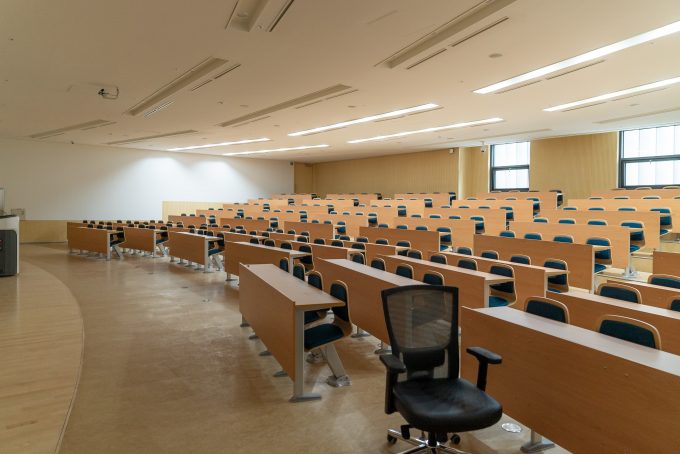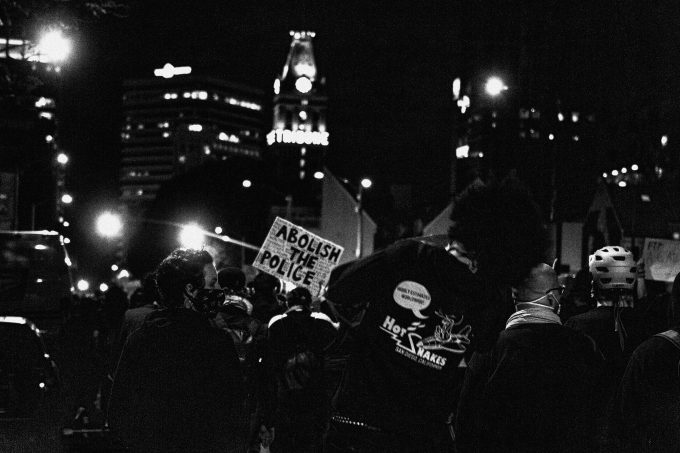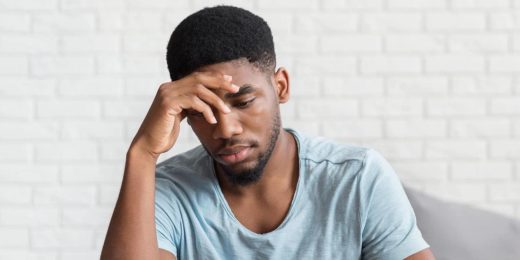Graduate Student Experiences in the Midst of Multiple Pandemics

COVID-19 has exposed America’s fragile fault lines associated with economic and racial inequality. In Summer 2020, Contexts Magazine: Sociology for the Public assembled a special COVID-19 issue. We received over 200 submissions from 25 countries, publishing some of the ones that made it through editorial review on our website. After peer review, some of these articles will be featured in our Fall 2020 issue on Pandemics.
Continuing this work, we asked members of the Contexts Magazine Grad Team to write essays from the doctoral student experience about the difficulties of this moment. The Contexts Magazine Grad Team typically writes 300-word essays on recently published articles in top sociology journals. This time, however, we hear directly from them. We ask that you really read to listen. Doctoral students are dealing with multiple sources of stress: a shrinking job market, racial inequity in their Black and Latinx communities, parenting during a pandemic, serving as caregivers to older adults, and engaging in racial equity work in the academy – an institution they collectively feel has failed them. We applaud these students’ courage to speak out. Their words matter. Contexts Magazine aims to be part of the solution to create space to listen, think, and then act to truly respond to the concerns of doctoral students during these troubling times. To our academic colleagues, we hope you do the same.
– Rashawn Ray and Fabio Rojas
-
- “Is the Academy Equipped to Properly Center Equity?” by Teagan Murphy
- “Agonizing Questions From a Black Graduate Student” by Simone Durham
- “Black Graduate Students are Tired but Continue the Work” by Joey Jennings
- “Impossible Circumstances for Parents and Grad Students of Color” by Chandra Reyna
- “Who does the healthcare system truly care for during COVID-19?” by Genesis Fuentes
- “Starting a Doctoral Program in Abnormal Times” by Katelyn Foltz

“Is the Academy Equipped to Properly Center Equity?”
by Teagan Murphy
When I applied to graduate schools last fall, I wrote about my desire to be a scholar-activist. Despite pursuing an academic career path, I aimed to avoid getting caught in a bubble of academia, and instead to pursue a path in which critical research findings and direct community impact can go hand-in-hand. These past several months, confronted with a pandemic that has further highlighted institutionalized racism and classism in this country, I have felt pushed more than ever to match my scholarship with my activism. But at the same time, I question more than ever my ability to do so.
For the past year, I served as a post-baccalaureate research assistant for the Wellness, Equity, Love, Liberation, and Sexuality (WELLS) Healing and Research Collective at the University of Florida. The WELLS Collective conducts research rooted in Black feminist theory and centers the liberation of queer and gender-expansive people of color. Being a part of WELLS showed me the investment, compassion, and emotion work that could be involved in conducting qualitative research on issues of oppression and liberation. My time with WELLS also showed me how to form a research team rooted in values of equity and collectivism. To me, WELLS painted a picture of what academia could look like – a picture of what we should strive for.
And yet, as much as members of the WELLS Collective worked to support one another, we felt ultimately unsupported by our institution. We constantly struggled with doing liberatory work in the confines of academia where we had to defend both our research and the “validity” of the queer Black and Brown experiences we were highlighting. We had to defend ourselves, our capacities, and our boundaries to the institutions that wanted our labor and were uninterested in our wellness.
This conflict became even more apparent over the past several months as academic institutions across the country failed to adequately respond to COVID-19, placing undue health risks and economic hardship on many of their students and employees. Simultaneously, in response to increased national attention on police brutality and institutionalized racism, I saw Black members of my collective and cohort faced with the painful irony of many of their White colleagues and supervisors now asking what “we” can do to address system racism in our institution – the very same people who had long ignored their collective calls for change and equity. Witnessing this has left me bitter and skeptical about whether and to what extent academia is really open and able to change.
As a prison abolitionist, I subscribe to a notion that some systems are so rooted in racism and classism that they cannot be reformed. These systems must be completely dismantled in order to create a new dynamic rooted in transformative justice. In the case of academia, I find myself wondering how far reform and gradual change can really take us.
Academia is oppressive. And truthfully, I would say that being a graduate student in sociology – especially during these pandemics – is a bit like being gaslit. We are exploited by “inclusive” institutions that are willing to use our liberatory work to gain diversity-centered clout, but are unwilling to accommodate us and eliminate the barriers that we have to hurdle every day. I have seen my queer, first-gen, Black, Brown, and Indigenous colleagues struggle, strive, and push to make academia a place where liberatory work can happen. I have seen institutions respond by making promises to improve, to be more accommodating, and to be more inclusive. Yet, these barriers persist, and academia continues to be a mechanism for gatekeeping and maintaining the status quo.
So, I’m left with these questions: Is academia salvageable? To what extent can we maintain academia or work within academia to reform it? Can academics (students, faculty, and researchers) play a role in liberation? Is it truly possible to be a “scholar-activist”?
Teagan Murphy (she/her) is a sociology doctoral student at the University of Maryland, and a Research Assistant for the WELLS Healing and Research Collective at the University of Florida. She studies social movements, community building, and social stratification through frames of intersectionality.

“Agonizing Questions From a Black Graduate Student”
by Simone Durham
On September 22nd, Donald Trump issued a presidential executive order that weaponized colorblind rhetoric to attack Critical Race Theory (CRT) and anti-racist scholarship and activism. His words cut deep because they accused me and other scholars of being not only un-American but perpetrators of racism. Reading through his demonization of the theories, concepts, and work I have dedicated my life to as a sociologist felt like an assault on my mind, heart, and soul. After enduring months of his inadequate COVID-19 pandemic response and sickening anti-Blackness in response to Black Lives Matter (BLM) protests across the country, it is clear that Trump and many that work with him simply do not value the minds of scholars whose research can actually “make American great” – at last, not again.
As a Black doctoral student in sociology studying race and racism as they pertain to social movements, identity, and meaning making, I am continuously mentally exhausted.
Knowing that academia wasn’t designed for Black people; questions the value of our knowledge, experiences, and research; and is resistant to change that would alleviate (let alone eradicate) these issues is exhausting. I am sometimes energized, but usually exhausted by thoughts about the harrowing topics I study and the long road ahead we must travel until they are no longer issues (if that is a destination that we can even get to). I am exhausted by the power of flawed and inequitable pressures of white-centered respectability politics that characterize academia. Despite positive intentions, I have exhausted myself – and unfortunately other Black and Brown students too – by succumbing to these pressures. This is what exhaustion for me looks like under normal circumstances, not even accounting for the general exhaustion caused by the doctoral workload and normal work-life pressures.
But things aren’t normal right now. We are living in a world of increased risk, suffering, and isolation. A major health pandemic like COVID-19 puts our entire society at great risk. The economic ramifications of the pandemic have produced psychological worry and tangible hardships for most of the population. Though most people have these worries, they are magnified for Black and Brown people. Structural racism makes us more vulnerable than other groups. Making this vulnerability worse, we live in a country where our government has never seemed to truly value or care about Black people. The current administration seems to just be more overt at expressing these sentiments.
Continued instances of anti-Black violence by police have pushed us to risk our health and safety to protest in the streets en masse. Instead of finally seeing how drastic conditions must be to produce this response, we are then blamed, shamed, and targeted for further violence.
Since the beginning of 2020, my level of exhaustion has heightened exponentially and proceeded beyond my mental state to my emotional and physical states as well. To be a Black doctoral student in sociology right now is to be living in a state of existential crisis. It means to be always asking agonizing questions and never truly finding satisfactory answers.
Why do people advocate for holding the murderers of Black people accountable through the very systems that oppress and harm us? But, what are our best alternatives in this very moment when we have not yet abolished these systems and created new anti-racist ones in their place? Is change even possible in a country rooted in a legacy of colonization, genocide, and racism, built on ever-evolving institutions that preserve these roots?
As a Black-biracial woman, how do I best contribute to the movement for Black liberation? I’ve protested, I’ve donated, I’ve signed petitions, I’ve talked to White friends and family members about race and racism – but it still doesn’t feel like enough. Will my scholarship truly matter, or can I only truly contribute to change through actions in the public sphere? Am I wasting my time through this agonizing process?
Will Trump win a second presidential election as my pessimistic Black intuition tells me he will? If he doesn’t, will he even leave the White House, or will he resist with force like the tyrannical dictator he has the potential to be? If Biden wins will the movement be successful, or die down and lose support through the placation of those who joined the movement in the past six months? If Democrats regain political power, will they ever rise to the challenge of creating the equitable America they promise? Or will they continue to perpetuate the status quo as they have thus far?
These are just some of the daily questions I ask myself. They all contribute to my biggest question: Is there any hope? The level of exhaustion I’ve reached leaves me with a simple response – no. But if there is hope for anything, I hope I’m wrong.
Simone N. Durham is a doctoral student in sociology at the University of Maryland, College Park, adjunct faculty at Morgan State University, and the Digital Managing Editor for Contexts Magazine. Her research focuses on race, social movements, identity, and meaning making.

“Black Graduate Students are Tired but Continue the Work”
by Joey Jennings
We tired, bruh. Being a Black doctoral student is exhausting. This is something I have learned during my time in the sociology department at the University of Maryland. The difficulties faced in a doctoral program produce various forms of mental and physical exhaustion. This fatigue is encountered during a normal year, but how does it look during an abnormal one?
Before entering my second year in the program, the country began experiencing multiple pandemics simultaneously: COVID-19 (coronavirus), economic disruption as a result, and widespread acknowledgement and uproar surrounding police brutality and systemic racism.
As a Black male experiencing these tragedies, I have spent many days attempting to support my community. I have spent other days mentally and emotionally shut down and physically unable to complete even the simplest task. I am worried about COVID-19, and I pray for the people who have come in contact with it and been affected directly by the virus. Furthermore, I am exhausted by seeing the “leader” of this country divide us once again. I am tired of seeing our “leader” make decisions that are not inclusive and equitable. I am exhausted seeing our “leader” spread unsubstantiated information in response to this pandemic. While he should be igniting some solidarity to help us overcome these times, he has instead issued statements which directly oppose expert government officials from the Centers for Disease Control and the National Institutes of Health.
Along with failing to properly handle the coronavirus, our government has failed us economically. Many families were already struggling to stay afloat before the virus, and with the economic disruption caused by the pandemic, things only became more difficult. Specifically, the government continues to fail Black people – who are still fighting the effects of systematic racism, discrimination, and lingering consequences of segregation towards wealth acquisition in the middle of a pandemic. Instead of caring about the people, our government has made it clear that they will prioritize the pockets of large corporations before they will support us. They made their decision, and as a result, we suffer the consequences of this irresponsibility.
Black Americans do fear these pandemics. However, this feeling of constant fear is not new in our community. The current fear, pain, and disgust we are feeling because of recent instances of police brutality and systematic racism are old and familiar to us. Tragically, we exist in a perpetual cycle of fearing the consequences of systemic racism. We fear an institution charged to “protect and serve” and double down on “law and order.”
We fear maltreatment. We fear losing our lives to racism, daily. We fear for our families, friends, communities, and future generations. The existence and prevalence of the racist legacy held by a country that claims to be “The Land of the Free” is unacceptable. We are tired of allowing these institutions which have racist and sexist ideologies embedded within them to destroy us. We no longer expect these institutions to do right; instead, we scream for abolition. We understand that the problems are structural, and for our safety, we can no longer allow them to exist.
There is much I want to do to help. Being a doctoral student is hard and tiring, but it can be rewarding. I have the resources to properly educate myself and those around me, and I will do just that to support my people. We will overcome these pandemics together. We will rid this country of every racist institution. We will continue this work until everyone is safe.
Joey Jennings is a doctoral student in sociology at the University of Maryland, College Park, and a National Science Foundation Graduate Research Fellow studying race/ethnicity, social movements, and social inequalities.
“Impossible Circumstances for Parents and Grad Students of Color”
by Chandra Reyna
Graduate students across the country are attempting to navigate working remotely amid disruptions to their research, budget cuts, and dwindling job market prospects. Graduate students of color and those who have families to provide for are simultaneously facing systemic challenges to navigating and existing within academia in the current moment.
March 11, 2020 was the last day I went to my office. Within a few days, my classes were moved online and my research was halted. My three school-aged children were home full-time participating in distance learning and their extracurricular activities were canceled. Similar to others, I spent the first weeks of the pandemic anxiously scrolling Twitter – consumed with the daily case rises, how the virus was transmitted, and how masks would help keep my children safe. Soon, I realized that I – a woman who moved 2,500 miles away from anyone she knew, with three children, alone, to pursue a graduate education – was nervous to go out and buy food for her family one mile up the road. What world was I living in and who was I becoming?
Six weeks into the pandemic, I rescheduled my comprehensive exam, packed my home, and relocated my children back to their hometown. At the time, I didn’t know what the repercussions of these decisions could be. But I knew one thing: mothers of color who head their households are not protected by institutions. And graduate programs, no matter how welcoming the program and advisors aim to be, are not built with parents in mind, much less those who are the only adults in their household. As a mother of color who has headed her household for over a decade, community has always been the solution. And our community was multiple time zones away.
My family’s return to our hometown collided with the presence of summer and the tragic death of George Floyd, which sparked nationwide protests and a resurgence of calls to defund police departments – even in my small town of only a quarter million people, 89% of whom are White. The fall equinox marked a summer filled with what feels like the theft of countless lives – both by the grotesque mishandling of COVID-19 and systemic anti-Black racism. It also marked a return of the academic year, a time in which graduate students of color are expected to perform for Predominantly White Institutions as if their communities are not being ravaged from every direction. Unfortunately, no amount of graceful email openers will lessen the pressure to perform and to complete a journey that many of us have worked for our entire lives.
Many sociology graduate students of color are navigating systemic racism in their personal lives, their professional lives, and often in their work as sociologists. And due to the COVID-19 pandemic, some are now doing so while running a household, managing distance learning, and supervising and attending to the emotional well-being of children of color in a world that devalues them. Each of these is a full-time job and none are sustainable, in tandem, long term.
Graduate students of color and those with families are being asked to work under impossible circumstances. But we are six months in and the end is not in sight.
Chandra Reyna is a doctoral student in the Department of Sociology at the University of Maryland, College Park. She studies Latinx and multiracial families, racial identity, and racialization.

“Who does the healthcare system truly care for during COVID-19?”
by Genesis Fuentes
When my mother was pregnant with my younger sister, she was told by doctors that my sister had a genetic disorder and would be born with down syndrome. While trying to figure out what to do, her doctors advised her to have an abortion. As my mother tells it, they said that any child with a genetic disorder born to my mother would be a burden to the state, assuming it was tax-payer dollars that would support her as she raised her child. Ultimately, she chose to go through with the pregnancy and my sister was born without any genetic disorders. Rather than focusing on the health or wellbeing of my mother and sister, what the doctors cared about were the economic consequences placed on the state if a working-class immigrant had a child, particularly one with increased medical needs. Their assumptions and recommendations made my mother feel more scared than supported.
Here we are more than 20 years later, and the health system continues to place state interests above the health of immigrants in the U.S. On September 14th, a nurse came forward and alleged that ICE detention centers were performing forced hysterectomies on immigrant women. As if the Latinx and immigrant communities have not suffered enough during these trying times, the discovery of these events further proved how little the American government and healthcare professionals value Latinx and immigrant lives. Growing up, my parents taught me about how the U.S. allowed doctors connected with the Tuskegee experiments to travel to Guatemala and perform the same type of heinous experiments on the Guatemalan people. As a child, I processed these stories as scary events that happened in history. As a doctoral student, I reflect on these stories and interpret current news through a historical lens about the practices of the American healthcare system. I know these recent allegations about the devaluing of immigrant bodies do not point to a new or revolutionary behavior allowed by the American government. Rather, these actions seem to be inherently American.
The US has a long history of accepting ideas of eugenics and White supremacy. The government has a history of forcing sterilization on women of color and women who it deems less worth of procreating. About 70,000 forced sterilizations happened in the US under a Supreme Court ruling in the 1920s. Between the 1960s and the 1970s, thousands of Native American women were forced to have sterilization procedures. Many Mexican-American women also suffered through forced sterilization up until the 1950s. And this is only an abbreviated list of all of the atrocities that have happened against women of color. The recent news of immigrant women having forced sterilization comes during a time when we are also experiencing a pandemic.
I completely understand why my parents feared going to the hospital when they recently contracted COVID-19. I pleaded with them to go seek medical treatment but at the end of every argument, they repeated over and over again that going to the hospital would kill them. They believed that staying at home, suffering, was more beneficial to their health than going to the hospital. My parents saw the hospital as a potential death sentence, as Latinx are significantly more likely to die from COVID-19 relative to Whites.
My parents carry with them the trauma of knowing what brutalities have happened under the name of healthcare and knowing that the healthcare system does not value their lives equally. The coronavirus has disproportionately affected communities of color and I wonder how many people have not gone to the hospital because they are terrified of the healthcare profession. We should ask ourselves: how bad do racial disparities in healthcare have to be for people to contract COVID-19 during a pandemic and think, rationally might I add, that care might be better away from the hospital?
Here I am, a sociology doctoral student, who knows the importance of going to see a doctor, but also knows the truth about how systemic racism plays a role in our healthcare system. When other people were unafraid of going to the hospital and getting the care they needed, my family chose to wait and try to heal themselves at home. I end up asking myself: who does the healthcare system truly care for? Who does it care for? When it forcefully takes away Latinx and immigrant women’s rights to future pregnancies, who does it care for?
Genesis Fuentes is in the sociology program at the University of Maryland, College Park. She studies social psychology, sociology of law, and police identity.

“Starting a Doctoral Program in Abnormal Times”
by Katelyn Foltz
I sat down to write this article countless times over the course of a week, and for some reason wasn’t able to make it happen. Despite the deadline looming over my head, I didn’t even know what to write. I am supposed to write about what it’s like to be a graduate student right now with the multiple pandemics (COVID-19, racial unrest, and economic angst) occurring simultaneously. COVID-19 completely changed every aspect of life, there’s widespread attention on police brutality and multiple murders of people in the Black community, and 2020 has been a year with many unexpected tragedies. Most recently, the death of Ruth Bader Ginsberg seems to leave women’s rights in the Supreme Court in the air for the foreseeable future.
So, what’s it like to be a graduate student right now? Honestly, my mind is totally on grad school, while simultaneously being physically away from the normal experiences of a first-year graduate student.
I started at the University of Maryland in August after finishing my Master’s Degree at another institution in May. For someone who really thrives on having a routine, May through August were some of the most difficult months of my life. I felt like I was grasping for some kind of routine – anything that would make this completely not normal situation feel a little more normal. But, I never found one. Depression and anxiety plagued me. I would feel anxious about any plans that I put in place – partially worried about the risk of exposure from the virus, but also because depression kept me from leaving my house. When school started up again in August, I honestly felt relief; something normal; something familiar; familiar stress, familiar routine. Familiar processing of the things that were going on in the world with classmates. I felt myself again for the first time since May.
But at the same time, it is different – so, so different. Navigating a new department and a new cohort via Zoom is not how I envisioned my experience in grad school. I find comfort being back in school, but also find it impossible to fully focus. My emotions distract me from investing fully in my school work. I feel guilty about no longer being present to help my family navigate this time. I constantly think about how my grandparents are living in an area where people don’t believe in wearing masks, leaving me in constant fear of them contracting the virus. I worry about the public pressure for kids to return to school in this same area, which will leave my mom, a school principal, exposed to 800 people everyday.
Living in this time where many people in this country blatantly do not believe in equity for so many is just plain depressing. So many communities are experiencing violence right now – both as effects of the pandemic and at the hands of insidious oppressive systems that form the foundation of the United States. Nothing about any of this is easy to process and attempting to do work as the world crumbles around us in these ways feels nearly impossible.
So, what’s it like being a graduate student right now? Absolutely normal and absolutely abnormal at the same time. My work provides me relief and a way to keep my mind off things, but my emotions keep me from being able to invest fully in my work. There’s an inner tug-of-war occurring – the need for a distraction from the outside world versus the inability to allow school to distract me from what’s happening around me.
Graduate students are navigating a very abnormal time under the same expectations that the academy had for us. We are supposed to be able to produce the same amount, learn the same information, and remain happy and healthy – none of which are truly realistic or sustainable right now. So, in all of this, I’ve learned to be kind to myself and adjust my expectations. I can’t think the same as I do in normal circumstances. I can’t get the same amount of work done. I also can’t be everything for everyone. None of us have done this before and we are all doing the best we can.
Katelyn Foltz is a first-year doctoral student in sociology at the University of Maryland, College Park. Her research focuses on the intersections between masculinity, race, activism, and sport.


Comments 13
Dewacintaqq
October 2, 2020https://dewacintaqq69.blogspot.com
Dewacintaqq
Dewacintaqq.com
link alternatif Dewacintaqq
http://45.76.127.220/?ref=NISA21
dewacintaqq
dewacintaqq.com
dcpoker99
simbolcinta
gemarq
oppaiqq
procintaqq
kartucinta99
maniak99
dcqq88
1001cinta
Aunt Bea
October 3, 2020Katelyn, you will be fine. You have lived through stressful times before. Just take a deep breath and write down 5 things you are thankful for.
chrisgail
October 5, 2020Nowadays Graduate students are facing many problems for completing their higher education due to corona-virus and now they are forced to contact the writers of
coursework writing service
chrisgail
October 5, 2020Nowadays Graduate students are facing many problems for completing their higher education due to corona-virus and now they are forced to contact the writers of
coursework writing service
bocaratonrehabcenter
October 9, 2020I have always been for the equality of all people, regardless of gender, race, orientation, financial status or physical / mental health. All this is so unfair in my opinion that every time people pay attention to it, I start to get very angry. I think it's awful. After all, we divide and oppress people according to those characteristics that they cannot change, no matter how hard they try. Is this fair? No, this is inhuman. And during the pandemic, we began to feel it more sharply. That's why I'm with you guys. Everything will be fine.
mapquest driving directions
October 16, 2020I am glad to see this brilliant post, all the details are very helpful and useful for us, keep up to good work. mapquest driving directions
Alia Parker
October 24, 2020Looking for “walking aids ”? Well, guess what, we have just what you need on our site! Check it out. https://www.aids4mobility.co.uk/walking-aids.html
Gonyak
November 3, 2020The pandemic period for students and graduate students is very difficult because the educational process is undergoing changes that do not best affect student performance. This is why students often have difficulty writing a variety of assignments, but these problems are solved by the service https://papersowl.com/apa-paper-writing-service, which employs real professionals who can quickly and easily write your APA paper, and most importantly qualitatively and without plagiarism. It is very convenient and saves time.
Lora
November 4, 2020You have lived through stressful times before. Just take a deep breath. I think it's awful. After all, we divide and oppress people according to those characteristics that they cannot change, no matter how hard they try. I can’t get the same amount of work done. I also can’t be everything for everyone.
Tyrone
November 5, 2020Grow the Fuck up buttercup! 'Oh poor me...I'm a grad student who is afraid, seeing Covid and oppression behind every tree. I didn't expect my grad school experience to be this...yada, yada, yada.' Think about all of the people who don't know how they are going to feed their kids, put gas in the car, pay their mortgage/rent because overreaching governors and local governments picked winners (those they deemed 'essential') and losers ('non-essential') in this so called pandemic. Your problems pale to the point of nothingness in comparison. Grow up...apparently money is being made available to you to waste on a degree not worth a flying fuck in the real world. You should quietly thank your God/Gods/Goddess or whatever it is your type worships and go about your business without broadcasting your ignorance.
dombra grey
November 11, 2020the pandemic period has become difficult for many people. Someone was left without a job, someone without business....
coca
November 12, 2020Your sharing helps a lot for my work. I have learned a lot from your post.
directions
cookie clicker
January 4, 2021Thanks for sharing your precious time to create this post, It so informative and the content makes the post more interesting. really appreciated.